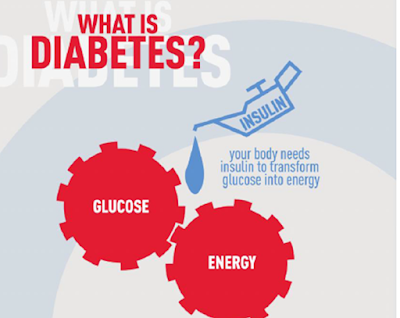In this portion
v What are the
different kinds of diabetes?
v How typical is
diabetes?
v Why should
bound encourage kind 2 diabetes?
v What ailments
might people with diabetes at any point make?
Diabetes is a
disorder that happens when your blood glucose, furthermore called glucose, is
exorbitantly high. Blood glucose is your essential wellspring of energy and
comes from the food you eat. Insulin, a compound made by the pancreas, helps
glucose from food with getting into your cells to be used for energy. Now and
again your body doesn't make enough-or any insulin or doesn't use insulin well.
Glucose then, at that point, stays in your blood and doesn't show up in your
cells.
Long term,
having an overabundance of glucose in your blood can cause ailments. Regardless
of the way that diabetes has no fix, you can take the necessary steps to manage
your diabetes and stay strong.
A portion of
the time people allude to diabetes as "a touch of sugar" or "minimal
diabetes." These terms recommend that someone doesn't have diabetes or has
a less veritable case, yet every occasion of diabetes isn't joking.
- What are the different sorts of diabetes?
The most
broadly perceived sorts of diabetes are type 1, type 2, and gestational
diabetes.
- Type 1 diabetes
If you have
type 1 diabetes, your body doesn't make insulin. Your resistant structure
attacks and demolishes the cells in your pancreas that make insulin. Type 1
diabetes is typically broken down in adolescents and young adults, despite the
way that it can appear at whatever stage throughout everyday life. People with
type 1 diabetes need to take insulin without fail to stay alive.
- Type 2 diabetes
Expecting you
have type 2 diabetes, your body doesn't make or use insulin well. You can
cultivate sort 2 diabetes at whatever stage throughout everyday life,
regardless, during youth. Regardless, this sort of diabetes happens most often indecently
matured and more prepared people. Type 2 is the most generally perceived sort
of diabetes.
- Gestational diabetes
Gestational
diabetes makes in specific women when they are pregnant. Generally, this kind
of diabetes vanishes after the youngster is imagined. In any case, if you've
had gestational diabetes, you have a more important chance of making type 2
diabetes shortly. A portion of the time diabetes dissected during pregnancy is
truly typed 2 diabetes.
Various types
of diabetes
More surprising
sorts consolidate monogenic diabetes, which is an obtained kind of diabetes,
and cystic fibrosis-related diabetes External association.

How ordinary is
diabetes?
Beginning in
2015, 30.3 million people in the United States, or 9.4 percent of the general
population, had diabetes. More than 1 out of 4 of them didn't understand they
had the disease. Diabetes impacts 1 out of 4 people past 65 years of age.
Around 90-95 percent of cases in adults are type 2 diabetes.1

Why should
bound cultivate kind 2 diabetes?
You will
undoubtedly cultivate sort 2 diabetes if you are age at least 45 laid out, have
a family foundation of diabetes, or are overweight. Real torpidity, race, and
certain ailments, for instance, hypertension similarly impact your chance of making
type 2 diabetes. You are in a like manner bound to cultivate sort 2 diabetes
expecting you have prediabetes or had gestational diabetes when you were
pregnant. Investigate risk factors for type 2 diabetes.

What clinical
issues might people with diabetes have at any point make?
Over an
extended time, high blood glucose prompts issues, for instance,
·
Coronary ailment
·
Stroke
·
Kidney disorder
·
Eye issues
·
Dental disorder
·
Nerve hurt
·
Foot issues
You can take
the necessary steps to cut down your potential outcomes by cultivating these
diabetes-related ailments.




0 Comments